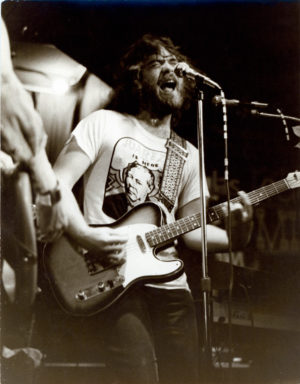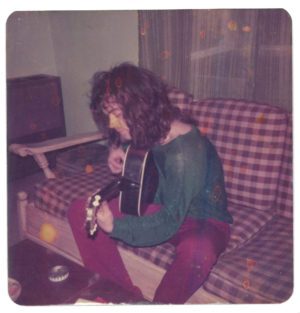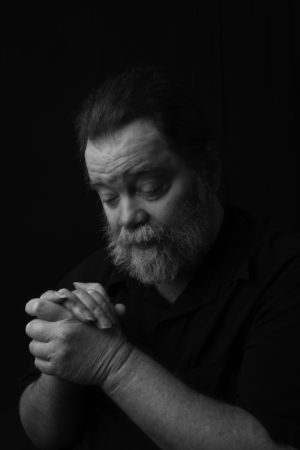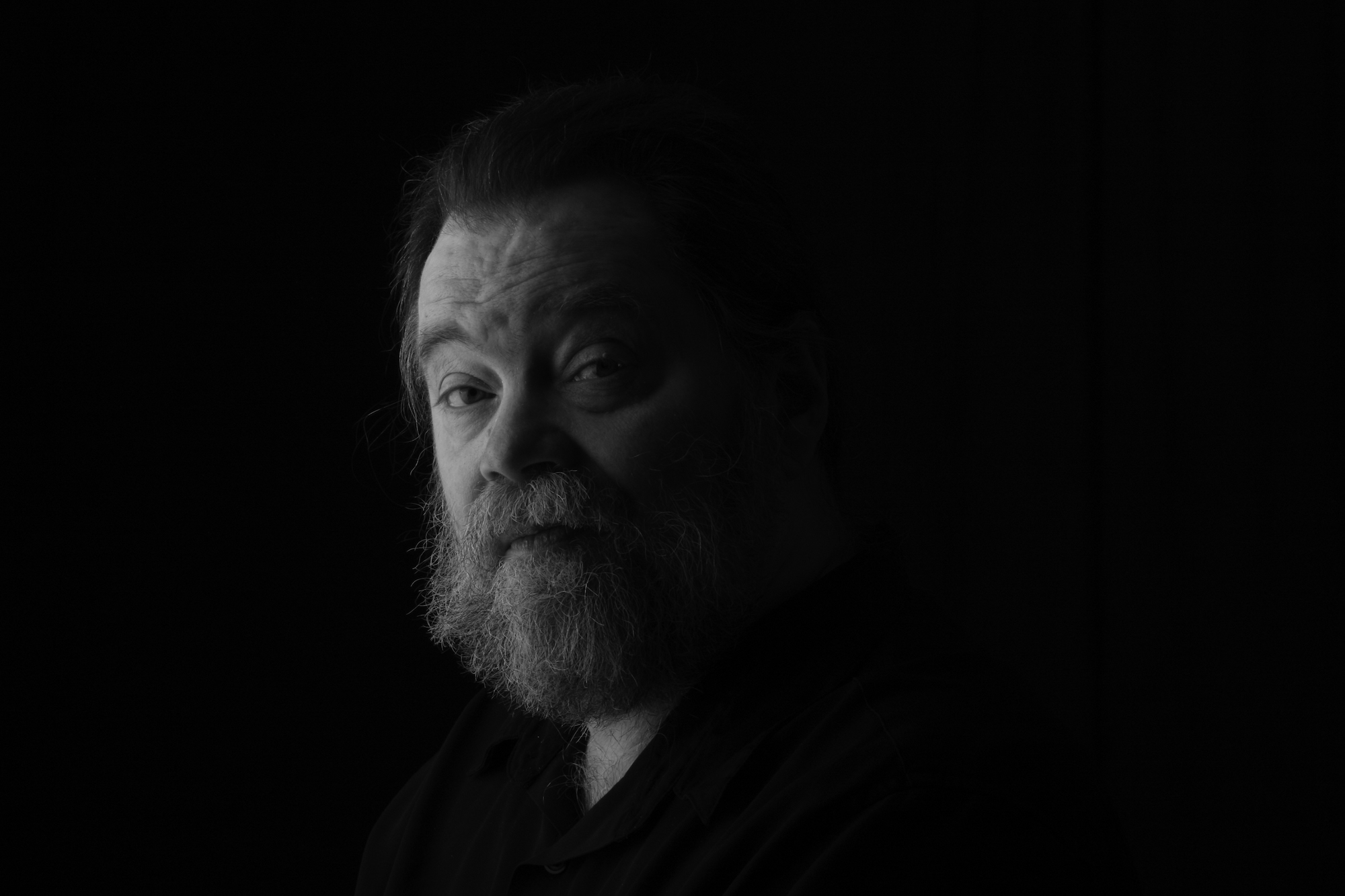Back in 1990, Roky Erickson—the legendary former frontman of 1960s Texas psychedelic pioneers The 13th Floor Elevators, who’d staged a remarkable solo comeback in the late 1970s following his hospitalization for paranoid schizophrenia—was in a bad way. A misunderstanding with some neighbors and the U.S. Postal Service had landed him in a federal mental health facility, and he was in desperate need of financial and legal aid.
Enter Warner Bros. executive Bill Bentley, who had witnessed firsthand the primordial live power of the Elevators as a Houston teen, and who had become friendly with Roky during the 1970s. Upon hearing of Roky’s plight, Bentley assembled and produced the Sire Records comp Where the Pyramid Meets the Eye: A Tribute to Roky Erickson, featuring covers of Roky’s songs performed by such illustrious artists as R.E.M., The Jesus and Mary Chain, Primal Scream, Butthole Surfers and ZZ Top. In addition to raising much-needed funds for Roky, the album reminded the world of his unique brilliance, set the stage for another creative comeback that began in 1995, and led to Roky receiving better medical and legal support.
Thirty years after the release of Pyramid—and two years after Roky’s death at the age of 71—Bentley is back with a new Roky tribute LP. Released by Light in the Attic Records, May the Circle Remain Unbroken: A Tribute to Roky Erickson drops this weekend as a Record Store Day vinyl exclusive, with a CD edition to follow later this year. The album features stunning new recordings of classic Roky tracks by artists including The Black Angels, Neko Case, Gary Clark Jr., Mark Lanegan, Alison Mosshart, Ty Segall, Lucinda Williams, Chelsea Wolfe, and Margo Price. (The vinyl version of the album will also contain a bonus flexi-disc of Roky himself singing “Love Hieroglyphics,” a previously unreleased song recorded in the early 1970s.)
The album also features incredibly moving liner notes from Bentley, which mix vivid reminiscences of Elevators shows and time spent with Roky with musings on how Roky’s music profoundly transformed his own life. We spoke with Bentley and Black Angels leader Alex Maas about this true labor of love, Roky’s music, and his special way of looking at the world.

photo by Craig Luckin
Alex, do you remember when you first heard Roky or the 13th Floor Elevators?
Alex Maas: I must have been a senior in high school when I first heard of the Elevators, but I didn’t really put their first record on until I was in college. I was still really heavy into The Beatles and just kind of on the cusp of discovering The Velvet Underground and getting my mind blown by that—and when I got into the Elevators and found out that this was happening all at the same time, my mind was blown again.
Years later, The Black Angels got asked to play at his birthday social in Austin, and after that we got asked to be his backing band. We were like, “Hell yeah, this is gonna be our chance to bring back the Elevators!” I went out to all these antique stores and found three jugs, and I was like, “All right, we’re ready to go!” I spent, like, all my money on these expensive things; I didn’t even know if I needed to put a pickup in it or just hold the microphone on it to get that “electric jug” sound [laughs].
“We were reteaching Roky these 13th Floor Elevators songs, and it was just incredible to slowly see the memories coming back in his eyes.” — Alex Maas
We wound up touring with him for a couple of years. The most important thing I took away from the experience was that music was so therapeutic for Roky. He was so displaced in the world; but after we’d rehearsed for two or three hours, his memory would come back and he’d start talking about when he was a teenager and he wrote these songs. We were reteaching Roky these 13th Floor Elevators songs, and it was just incredible to slowly see the memories coming back in his eyes. And then after we hit our stride and started touring with him, his manager Darren [Hill] asked us if we wanted to do some of his later solo songs, and when you have the Black Angels’ sound with his later “monster” songs, it felt to me something like White Light/White Heat–era Velvets.
Bill Bentley: It’s kind of like the album title says: the circle remains unbroken. “May the Circle Remain Unbroken” was the last song he wrote in the Elevators, and I think Roky’s whole philosophy is sort of captured in that phrase. Even with all his mental challenges and everything, he never quit. His circle remained unbroken through some incredibly hard years. There were times in the ’70s when you’d run into Roky and you would want to start crying because he was just so lost; but he never gave up. I think of him as like a Texas frontiersman, almost. Whenever I was hanging out with him, he’d just look at me and say, “Are we doing OK, Bill? Are we OK? We’re OK—we’re doing fine!” [Laughs.]

photo courtesy of Light in the Attic
Bill, how did you go about putting this album together? How similar was it to making Where the Pyramid Meets the Eye?
BB: It was different than the first one, which was mainly to raise money and consciousness to help Roky. This one, with Roky being gone, was like this love letter to him. And I just let love guide me to people that I knew had a big part of their heart for Roky, as well. I didn’t know Neko Case was a fan, but she posted something on YouTube right after Roky passed saying, “I feel like my world has burned down.” Chelsea Wolfe posted a cover of “Night of the Vampire” and put it up on YouTube right after he passed, just to show her love; and I’d worked with Jeff Tweedy and I knew that he really, really liked Roky and the Elevators. Charlie Sexton—Roky used to stay at his mom’s house when he was a little kid. He has some good Roky Erickson stories!
I wanted to get Gary Clark Jr. involved, because I always loved Gary, back to the old days when he was just a teenager. His guitar playing is, to me, emotionally reminiscent of Stacey Sutherland [of the Elevators]. It’s blues based, but it goes beyond that. And I wanted him and Eve Monsees, his high school friend, together on this because that’s family. And then Mark Lanegan’s such a Roky fan, and Lynn Castle who sings with him—she’s an 80-year-old singer I knew in LA who loved Roky, and she had been produced by Jack Nitzsche back in the ’60s. She goes all the way back to that real first psychedelic era.
“May the Circle Remain Unbroken’ was the last song he wrote in the Elevators, and I think Roky’s whole philosophy is sort of captured in that phrase. Even with all his mental challenges and everything, he never quit. His circle remained unbroken through some incredibly hard years.” — Bill Bentley
I wanted pure love on this record from every single artist. Lucinda Williams, she used to sing on the streets of Austin in ’73, and she used to come by Roky in this crappy part of Austin where she was busking, at a time when both of them had nothing. Billy Gibbons, I remember going to see the Elevators with him in ’66, and both of us going, “Holy God, what is this?” All the way to my son, Brogan, who I literally raised on the Elevators. So yeah, that’s what guided me—those people who had a total cosmic connection with Roky’s music.
I love that Billy’s the only artist on both albums—with ZZ Top on the first one and solo here—since he went so far back with Roky.
I’m glad you picked up on that, because I did that for that very reason. He was really the only guy who should be on both. And he really came through on this, with such a great version of “Leviation”—he told me [growls], “I got mah guitar to sound like a jug!” [Laughs.] He asked me to put a special line on his credit for the songs, like “Inspiration from Tommy Hall for the electric jug,” because Billy knew exactly how overwhelmingly influential Tommy Hall was on Roky. Billy learned so many cosmic musical lessons from the Elevators—how to create something that isn’t just based on the earth. I mean, his high school band, Moving Sidewalks, their first single was called “99th Floor”!

photo by Todd Wolfson
No coincidence there!
BB: Not at all. And Alex, I just want to tell you, thank you for your track. The way you guys did “Don’t Fall Down”—not only does it feel like a brand new song, but you’ve totally captured what Roky and the Elevators were about back in 1966. It’s so beautiful!
AM: Thank you so much! I’m kind of a new father, so I totally relate to that song, just in terms of the accountability of relationships and people and what’s happening in the world.
BB: When I used to go see the Elevators, that wasn’t one of their most recognized songs; it was never a single, and they had so many other high-velocity songs. But when we would see them play that song in the early days, it was so haunting, and it just always stood out to me. When we did the first tribute record, nobody wanted to do it! I asked a couple of bands and they were like, “Nah, that’s not really the song for us.” So I was so, so happy that you guys did it, and did it so creatively.
AM: I also have to say, that letter you wrote to Roky [in the album’s liner notes] is just the best thing I’ve ever seen written on Roky. It’s just so touching.
“This whole album was such a spiritual and emotional catharsis for me. I just felt like, for once in my life, I just had to really open up about how I felt about the Elevators. Because they not only changed my life, they kind of made my life in an interesting circular way of just beliefs and things beyond us.” — B.B.
I totally agree—and it’s the best thing I’ve ever seen written about the Elevators, and what it was actually like to see them in their heyday.
BB: Thank you. This whole album was such a spiritual and emotional catharsis for me. I just felt like, for once in my life, I just had to really open up about how I felt about the Elevators. Because they not only changed my life, they kind of made my life in an interesting circular way of just beliefs and things beyond us; that’s about the best way I can put it, really and truly.
Do you think Roky knew how much he was loved by so many people around the world?
BB: I think he did, deep down inside. He didn’t ever really talk about himself, you know? Probably because it was hard for him to do that after all he’d been through. He always had a sweetness to him; I think all the love that was sent his way kept him from ever getting bitter. I never heard Roky Erickson say a mean thing about anyone or anything. Even when he was talking to the radios and the TVs in his house, with them all on full-tilt, I never saw him go to a dark place. That’s why he would say, like, “Are we doing OK? Is everything good?” I think he just wanted to keep it on “Good.” He never said, “Is something wrong?” It was always, “We’re doing good, aren’t we Bill?” And I feel him now seeing this record and smiling; I really can feel that in my heart. FL









